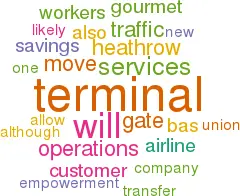LHR Terminal 5: the major opportunity
September 2005


In 2008, after some 30–plus years of planning, Heathrow’s fifth terminal is due to open. The topping–out ceremony took place recently so the building is now watertight. It has been agreed that British Airways will move all its Heathrow services into the new terminal along with those of most of its global partners.
At the moment the company operates services from all the other four terminals although most of its short haul services are operated from Terminal 1 and long haul (plus Paris and Amsterdam) from Terminal 4. As the new terminal is some five years later than was really required BA and partner services have been forced to operate from diverse terminals. This delay has created significant inefficiencies in the carriers operations at its home base.
The move will give the company a very strong boost in productivity at Heathrow. It will certainly help in its aim to simplify its business at the very base of its business itself.
The cost saving from combining operations into one terminal at the moment is unknown — although next year BA may come up with some realistic figures — but is likely to be substantial.
Moving all its operations (and those of its partners) into a single terminal allows it to rethink how a terminal operates and re–engineer its ground traffic flow management.
Simplification and empowerment
The company’s strategy revolves around simplification, customer empowerment and cost savings in areas invisible or hidden from the customer. We would envisage that in the new terminal BA and the airport operator BAA in coordination redevelop the traditional flow of traffic through check–in to gate.
BA will force (aka encourage) more of its passengers to book, ticket and generate boarding cards online (and incidentally increasingly move to charge those who do not).
It is feasible to imagine that BA will further develop customer empowerment for those who have used all the online services to allow them to move directly from kerbside to airside (via a bag drop–off point if necessary) by no more than electronic access.
Security of course cannot be compromised and it seems nigh impossible to generate any savings of time or effort from what will continue to be a bottleneck in traffic flows through any airport.
However, there are some possibly very good savings to be made from reducing and redirecting staff resources in the check in process.
The single terminal operation will additionally allow significant improvements in transfer baggage handling and tracking. It is likely also significantly to improve minimum transfer times. Although this is unlikely to provide sufficient savings to allow BA to compete effectively against the likes of Air France/KLM at Paris CDG and Amsterdam or Lufthansa at Frankfurt and Munich for transfer traffic and hub–and–spoke operations (even if it really wanted to) it is likely to improve the value and yield of such traffic it accepts.
Crewing, line maintenance, operations, catering: all will be directed to one end of the airfield which will remove some logistic inefficiencies from the current position.
There should also be some efficiencies to gain in the use of office and other behind–the–scenes space within the terminal and consolidation of lounge and premium customer services — not only its own but also those of its oneworld partners.
Union issues
The move to Terminal 5 has been seen by some observers as an opportunity to tackle remaining restrictive working practices at the airline, or even to de–unionise the company.
The difficulties of this approach are amply illustrated by the ongoing dispute at Gate Gourmet, BA’s independent catering supplier.
Following the dismissal of 670 strikers at Gate Gourmet (the former Swissair unit, now owned by Texas Pacific Group), all BA’s flights have been left without in–flight catering,and, worse, BA workers joined an illegal sympathy strike in early September, causing flights to and from Heathrow to be halted for days, costing the airline up to £40m and doing considerable damage to its reputation after similar labour troubles in the two previous summers.
The Transport and General Workers' union represents the Gate Gourmet workers and thousands of BA’s Heathrow ground staff.
Against a background of internal power struggles at the union, the T&G leader Tony Woodley was under pressure to be seen to be tough in defence of members at Gate Gourmet (despite the firm being on track to lose £25m at Heathrow this year, a loss partly blamed on the contract signed with BA).
BA was dragged into the dispute as Woodley argued that the airline trade unionists could not let one of BA’s big suppliers treat its workers badly. An ulterior motive was also to remind the airline of the power of the union in the holiday peak season.